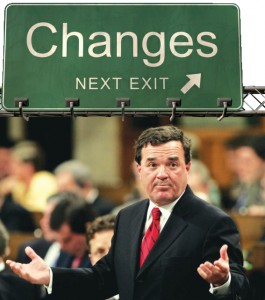“Our first clue – the overnight lending rate in the U.S. would remain the same until 2014. The second clue was the most recent changes to mortgage rules here in Canada.”
On Tuesday, the Bank of Canada made no adjustment to the overnight rate. No increase and no decrease. The announcement from the BOC reminds me of the movie Groundhog’s Day. For the 15th consecutive time there’s been no change to the overnight rate, and it looks like it will be much the same for at least another 14 months. According to the Central Bank, Mark Carney, we will not see any movement or adjustment to the overnight rate until 2014; it is suggested that time rates will gradually start to rise. Then again the BOC indicated last year that by June of 2012, interest rates would be up by 75 to 100 bps. Correct me if I’m wrong but that doesn’t appear to have happened. I guess the crystal ball is a little murky. Fascinating, we can’t predict, with any certainty, what the weather will be like three weeks from next Wednesday, but we can predict where rates will be in 14 months.
The fact of the matter is that most recent BOC rate announcement was big yawn. Ben Bernanke, U.S. Federal Reserve Chairman, recently announced that the overnight lending rate in the U.S. would remain the same until 2014. That was our first clue. The second clue was the most recent changes to mortgage rules here in Canada. Clearly the BOC cannot slow down the housing market in Canada by way of monetary policy, so regulations will have to do. As soon as the rules changes were announced it was a clear signal, 2014 it is. The big benefactors are all those that are renewing mortgages in the next 12 to 18 months. The time coincides perfectly with what can only be described as the halcyon days of our industry. All those five years mortgages taken out in 2006, 2007 and 2008, are coming up for renewal. There’s a good likelihood that the effective rate for the economic life of those mortgages, original term and renewal, is free money. I consider any rate less than 4% free money.
The BOC is predicting modest growth for 2013 and 2014, a clear sign that the global economy is at best, fragile. A number of Central Banks around the world recently cut their overnight lending rate in an attempt to stimulate the economy. No such indications of that happening here in Canada. What is happening in Canada is that investor sentiment is starting to wane. Manulife’s Investor Sentiment Index was down in the first half of 2012. The report suggested less enthusiasm for almost all types of investments, including fixed income securities, investment properties, balanced funds and cash. Sophisticated investors are weary and starting to sit on the sidelines. What happens when the uninitiated start to make purchasing decisions purely based on headlines? There might have to be an adjustment to the economic growth forecasts for 2013 and 2014.
Until next time,
Cheers.
Read More Add a Comment If you’re in the mortgage industry and you’re not aware of the announcement made by the Ministry of Finance and OSFI last week, welcome back from the other planet you were visiting. If you’re spaceship was delayed in getting back to mother earth, here’s what you missed. Mortgages bad, government very wise. We’re all aware of the changes, amortization period reduced, LTV for refinances was cutback, and GDS and TDS was adjusted as well. And if you can afford a home over one million dollars, who cares about you. All very straightforward and in it of itself not devastating to the housing and mortgage sector. But we cannot look at these changes in isolation. It’s the cumulative effect of all the changes that have taken place in the last three years which gives us reason for pause and be concerned.
If you’re in the mortgage industry and you’re not aware of the announcement made by the Ministry of Finance and OSFI last week, welcome back from the other planet you were visiting. If you’re spaceship was delayed in getting back to mother earth, here’s what you missed. Mortgages bad, government very wise. We’re all aware of the changes, amortization period reduced, LTV for refinances was cutback, and GDS and TDS was adjusted as well. And if you can afford a home over one million dollars, who cares about you. All very straightforward and in it of itself not devastating to the housing and mortgage sector. But we cannot look at these changes in isolation. It’s the cumulative effect of all the changes that have taken place in the last three years which gives us reason for pause and be concerned.
We have every right to be concerned because this industry is our livelihood. Unlike “elected” political officials and government “employees” this industry is more to us than a theoretical exercise. As an industry we have a responsibility to support efforts as it relates to the long term viability of the housing sector. Anyone, with a modicum of common sense, understands the concept of short term pain for long term gain. However, stakeholders have every right to call out decision makers if there’s concerns that the decisions made today may have unintended consequences. We also have every right to ask decision makers to articulate, in a clear and cogent fashion, the rationale behind the decisions they made.
When clarity is missing you’re left to your own interpretations and code breaking ability. From my viewpoint these changes mean that interest rates will remain at historical lows for an extended period of time. Given what the US Fed said recently, unemployment rate will be higher than 8% and slow growth until Q4 of 2014, interest rates are not going up anytime soon. The changes also suggest that government is guessing how Canada will fare within the global economic reality. It was three months ago that Fed’s said no further changes to mortgage rules was necessary. So what happened in the last ninety days? Nothing in Canada, but in Europe, the US and China, a whole lot happened. That’s our new reality, Europe, the US and China sneezes, Canada grabs a tissue and wipes its nose.
There’s a risk with every move the government makes. It’s clear that the government cannot slow down the housing market through monetary policy so they’ll attempt to do so through regulations. If the government is too “successful” in slowing down the market which leads to job loss and erosion of wealth, well, home owners will look for someone to blame. It’s one thing for voters to believe that we all fell off the real estate cliff together due to a natural real estate cycle. It’s altogether different when the home owner can say, “we were pushed off the cliff”.
Until next time
Cheers
Read More Add a Comment  “Firstline played a major role in the development and growth of the mortgage broker channel.”
“Firstline played a major role in the development and growth of the mortgage broker channel.”
I suspect by now you’ve heard the news that CIBC has decided to wind down it’s broker brand, FirstLine Mortgages. The industry has been rife with rumors about FirstLine’s future for some time now. CIBC finally had to confirm that FirstLine was in play, for sale. There was chatter that a sale was imminent and that the FirstLine brand may survive but in the end it ended up being “the end” for FirstLine.
CIBC made a business decision to wind down FirstLine, and not being privy to the facts it would be inappropriate on my part to say if they were right or wrong to do this. I will say this, it’s a shame. Firstline played a major role in the development and growth of the mortgage broker channel. Many moons ago I worked for CIBC/FirstLine, as the Area Franchise Manager, Western Canada, for Mortgage Centre Canada. I thought about about some of the people I worked with back then, and the others who at one time worked for FirstLine. Many of our industry leaders today were at one time employed by Firstline. To me this is a mark of an organization that prided themselves on hiring the best people, for many of these people went on to lead other organizations. FirstLine always had a reputation for being the best. They set the standard for all others to follow. As a competitor, on more than one occasion, I would curse their name. I did so out of begrudging respect. I always wanted to beat them but not this way.
In time FirstLine will fade from our memory. But before that happens I think we should reflect on the importance of FirstLine, and the contribution this brand made to our industry. No one should take delight in this announcement. As a former customer and a present day competitor, I want to thank FirstLine for their historical relevance and for the contribution they made towards legitimizing our industry.
Until next time,
Cheers.
Read More Add a Comment
The one significant difference between the Australian and Canadian broker market is broker market share. CMHC just reported that in Canada, broker market share is 27%. In Australia, it’s 42%.
 Attending the MFAA Conference has accorded me the opportunity to garner insight into the Australian broker market. The stakeholders in Australia are as passionate and committed to their industry as we are in Canada. I am struck by the market similarities we share, as it relates to the overall economy, and the broker market specifically. One similarity we share is negative press. The issues are different but the press in Australia is as committed to fear mongering as it is in Canada. There’s no talk of too much consumer debt here, yet their average mortgage balances are no different than in Canada. Here the primary focus is all that could go wrong beyond Australia’s boarder, which in turn will lead to the destruction of the Australian economy.
Attending the MFAA Conference has accorded me the opportunity to garner insight into the Australian broker market. The stakeholders in Australia are as passionate and committed to their industry as we are in Canada. I am struck by the market similarities we share, as it relates to the overall economy, and the broker market specifically. One similarity we share is negative press. The issues are different but the press in Australia is as committed to fear mongering as it is in Canada. There’s no talk of too much consumer debt here, yet their average mortgage balances are no different than in Canada. Here the primary focus is all that could go wrong beyond Australia’s boarder, which in turn will lead to the destruction of the Australian economy.
Europe’s an issue; however, the press in Australia is casting its worrisome gaze in China’s direction, which on the surface is laughable. China is Australia’s largest trading partner. The Aussies distanced themselves from the U.S. market years ago. They decided to hook their wagon to an emerging market like China, and fortuitously decided to distance themselves from the world’s largest sub-merging economy, the US. Ah, but gory headlines are needed, so the focus is on China’s slowing economy. It appears that 7 1/2% growth is no reason to celebrate or feel comfortable. The talk is will China have a soft or hard landing, which ultimately will impact the Australian economy. Can you imagine, if the US was forecasting 7 1/2% growth, and what that would mean for the Canadian economy? Yet somehow 7 1/2 % growth in China could have a negative impact in Australia. Just wondering what part of 71/2 % growth produces a hard landing? I guess the old saying about the press is no different in Australia – “if it bleeds…it leads”.
The one significant difference between the Australian and Canadian broker market is broker market share. CMHC just reported that in Canada, broker market share is 27%. In Australia, it’s 42%. I’ve asked every Aussie I’ve spoken to at the conference the following: “how did brokers grow their market share to 42%”? As I suspected, there was no one definitive answer, but there were some underlying themes.

It appears that the psyche of the average Aussie plays a part in those market share numbers. Aussies have a deep distrust of the banks and animosity towards their profits. Many Aussies believe the higher cost of borrowing has contributed to those bank profits. Yet, banks in Australia have a 90% market share of all broker business. So that distrust and anger has not resulted in less business for the banks. In large part that is due to the lack of competition, but it appears also that consumers look to brokers to provide them with the best of the least tasteful option. Interesting, to say the least.
Another critical factor which contributes to the success of the broker channel is the investment that the large firms make towords advertising. I had the pleasure to speak to Michael Russell, CEO of Mortgage Choice in Australia, about this very subject. Without getting into specifics, Mortgage Choice invests multiple millions of dollars in advertising. Their individual franchises advertise on their own, which collectively exceeds the dollar amount committed to advertising by Mo rtgage Choice corporately. Throw in Aussie Hone Loans, and number of other firms which advertise, and it’s easy to see why an Aussie consumers would chose a mortgage broker. Some of the larger broker firms in Australia spend more on advertising than the banks do, as it relates to mortgages. The messaging is choice, service, quality of broker, trust and yes, pricing. Since the GFC (Global Financial Crisis), Aussies are far more focused on price. However, price alone is not enough. The Aussie borrower is looking for utility and competency.
There’s plenty to learn from the Australian broker experience. Volumes speak, like $90 billion a year in origination. I’m looking at a rate sheet from Westpac, one of the major banks in Australia, and their 5 year fixed rate is 6.99%, and the good news is their ARM pricing has been reduced to 7.09%. You may be surprised to learn that 60% of all mortgages in Australia is ARM. The most recent MFAA Home Finance Index, which measures consumer sentiment, indicates that the percentage of consumers who would chose a broker first, as compared to those who would chose a bank first, is almost identical. We share many similarities with the Aussie broker market, yet some of the differences are profound.
Until next time
Cheers
Read More Add a CommentFor God’s sake they should get a couple of thousand tugboats, some good strong rope, and tow this island somewhere closer to civilization.
In the name of all things holy it’s far. For God’s sake they should get a couple of thousand tugboats, some good strong rope, and tow this island somewhere closer to civilization. For transparency I was fortunate to be able to sit at front of the bus for the flight over. That gave me the opportunity to stretch out and get some sleep, some seven hours’ worth. It was the other fifteen hours that I had to fill, and what I learned is that to pass that amount of time away you need a distraction. Like food! The flight attendants try to feed you at every moment. “Mr. Bozic, is there anything I can get you?” Let me see, it’s been 22 minutes since my last meal, “sure, how about some dim sum and 4 bags of chips”. I’m not kidding.
The real estate market is red hot here – This according to the cab driver who drove me to my hotel. Property values are increasing by 10% annually, and he owns multiple properties. Hmm, interesting. I was afraid to ask him if he was a part-time mortgage broker. Let me rephrase that, I was afraid of the answer. I have this illusion that the Australian mortgage broker industry wouldn’t allow that.
As soon as I unpacked at the hotel in Melbourne, I went for a walkabout. I went out and picked up two newspapers, which I planned to read from front to back, so that I can get a flavour of what’s current and happening in Australia. On the front page of The Australian and The Daily Telegraph was this number one story: the original Wiggles are no more. Yes, Australia’s jewel and gift to children’s programing is going through a radical makeover.  Three original members are leaving for personal reasons; the usual, wanting to be closer to family etc. Yeah right, one day the truth will come out and we’ll all learn that there’s a Yoko Ono story in there somewhere. One of the replacements is, are you sitting down, a Wigglette. Only 22 years of age, Emma Watkins is the new face and the first female member of the Wiggles. If you’re wondering she will dawn the yellow shirt.
Three original members are leaving for personal reasons; the usual, wanting to be closer to family etc. Yeah right, one day the truth will come out and we’ll all learn that there’s a Yoko Ono story in there somewhere. One of the replacements is, are you sitting down, a Wigglette. Only 22 years of age, Emma Watkins is the new face and the first female member of the Wiggles. If you’re wondering she will dawn the yellow shirt.
Australian stock market has tanked. It’s lost all of its gains in 2012. The European debt crisis dominates the business section but the major banks here feel they’re insulated because they have been preparing for the inevitable for some time now. Australia biggest trading partner is China. As goes the Chinese economy so goes Australia’s.
The best five year fixed rate I could find is 6.5%. Gulp!
Melbourne is a lot like Vancouver, from architecture to the overall feel. Melbourne hates all things Sydney; just like Vancouver and Toronto.
The learning continues. The bastards drive on the wrong side of the road. I was nearly killed twice jaywalking.
Revolving doors at the hotel turn in the opposite direction. Smacked my head a few times – D’OH!
Clearly I speak funny. I was in Melbourne for less than twelve hours and two people asked me the following: “so you here on vacation, mate?”
The most important thing I’ve learned so far is that there’s no awkwardness in meeting family for the first time. It was odd talking to my cousin on the phone, making plans to meet at the hotel and having to describe what I was wearing so he could pick me out of the crowd. He found me, and I got a chance to spend some time with him, his beautiful daughter, his brother and his mom, my aunt. They were extremely gracious and they treated me like family. It doesn’t matter what happens from here – that will be my lasting memory of this trip.
Until next time
Cheers
Read More Add a Comment